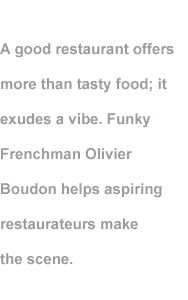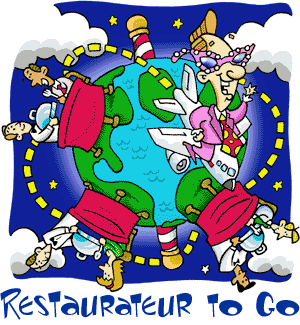 |
|
||||||||||||

|

|
|
By Noah Janssen
|
Olivier Boudon, a 28-year-old, cross-dressing restaurant consultant living in China, heard through the tightly woven expatriate grapevine that he was wanted for an interview in Shanghai. He surfaced there several days later, made contact with 1099 from the French Consul's house (where he was staying), and announced that he was prepared to meet that afternoon. This is his unlikely story. Born in the small town of Aurillac, France, Olivier practically grew up in his mother's disco and in restaurants owned by his grandparents (maternal and paternal). He says his unusual childhood has had a big effect on his career: constantly surrounded by entertainers and people working at jobs they actually liked, Olivier grew up thinking that work should be fun and life should be lived spontaneously. At age eight he decided he would be a chef. Unlike most childhood dreamers, Olivier actually pursued his earliest professional aspiration -- after high school he landed a job as a sous chef with the exclusive Parisian catering service, Cercle de Bois de Boulogne. He was young, but he had worked plenty in his grandparents' kitchens and knew what he was doing. A few years passed and Olivier, a flamboyant guy who's always the center of attention because he simply does whatever pops into his head, grew hungry to see the world outside France. So he looked for work abroad and found it in the kitchen of a Madagascar hotel. This led to a remarkable series of adventures that has become a way of life. Feeding the Material Girl After a brief stint in Madagascar, Olivier went to Poland, and it was there that he first moved out of the kitchen and into business for himself as a freelance restaurant consultant. In Warsaw, he helped his friend open and promote Monmartre, a traditional French restaurant. Later Olivier opened another French restaurant, Belle Epoque, in the south of Poland; and eventually he returned to Warsaw to open Paris-Texas, which serves what might be called French-Tex-Mex-Cajun cuisine.
In between restaurant openings, Olivier went to America, where he served briefly as Madonna's personal chef in Coconut Grove, Fla., and then to London, where he cooked for the Brazilian Ambassador to England. While working for the ambassador, Olivier was called by a friend who wanted help opening a French restaurant inside a Moscow casino. And this, says Olivier -- international connections through friends and acquaintances -- is how he's stumbled into these situations all over the world. When people meet him, hear his outrageous story, and experience his flamboyance, they're left with an unshakeable impression. If those people are in the restaurant business and have a project in mind (and someone always does), they invariably want Olivier to be on the job. The Moscow gig started Olivier's movement east, and once he was through with his work there, he set off for China, where he'd agreed to help open yet another French restaurant. When he arrived in Beijing after a long trip on the Trans-Siberian railway, however, he discovered that his contact had abandoned not only his restaurant idea, but China too. Unfazed, Olivier sought out some friends of friends in Beijing, who soon introduced him to two investors they knew (one from Beijing, the other from Hong Kong) who were eager to open a restaurant. The fruit of the relationship was a French restaurant called Bleu Marine, still one of Beijing's hot spots. It All Comes Together in China In China, Olivier has focused his services on the initial phases of restaurant development -- concept to launch -- though in some cases he'll stay on after the official opening to train staff. If all goes smoothly, his involvement only lasts a few months. (Because investment in China is so risky now, Olivier chooses not to have equity in the restaurants he's opened there, though he's frequently offered equity as part of his compensation. He prefers to maintain pure consultant status and get in and out quickly.) In the heat of a project, he'll commonly work 18-hour days, seven days a week. The people who approach Olivier with restaurant projects usually have a vague idea of what they're looking for, but have no experience in defining the details and making the whole thing happen. Olivier comes in, designs the menu and the interior, and takes care of every detail down to the silverware and napkins. An abundance of inexpensive labor in China gives Olivier a lot more latitude in choosing the interior decorations than he would have in the West, and he often has items custom-made. On the other hand, Western spices and ingredients can be hard to come by (though less so recently). Designing a Western-style menu and actually providing the goods requires a bit of creativity.
Once a restaurant is operational, Olivier orchestrates the opening night. This is when the flamboyant Frenchman truly shines. Actually, he holds two openings, on successive nights. Olivier's restaurants tend to be pricey, ranging from $30-$50 per person for dinner, and he must therefore generate buzz among people with money. To this end, he invites a select group of diplomats, executives, and local celebrities to the first opening night. They come because it befits their status to be among the very first patrons of the latest chic watering hole, and because there's free food and drink. Olivier tells them all about the party planned for the next night, promising that it will be bigger still, and telling them to spread the word. He's a master of hype. "Eighty percent come back for the second night," boasts Olivier.
Crowd-pleaser When Olivier arrived in China, he made a conscious decision to flaunt his homosexuality for self-promotion purposes. Although the Chinese government recently declared homosexuality wrong and illegal (they used to deny it existed), Olivier tells everyone about his sexual orientation. (He moves almost exclusively in expatriate circles, and doesn't worry much about Chinese laws anyway.) He wears outrageous outfits and tries not to wear the same thing twice, a feat he claims to accomplish by paying several tailors in Beijing and Shanghai to make clothes for him based on his own designs. At the interview with 1099, Olivier wore leather trousers with a faux-skirt effect on the front combined with an animal-print vest that exposed much of his back. Acknowledging that his image has helped attract attention to himself and to his clients, Oliver says, "People come to my restaurants to see the animal." In a business that thrives on hype, Olivier's outrageousness is at once a commodity and a service. "If people come into my restaurant and forget about their problems for a moment, that's perfect," he says. When asked about the drawbacks of his lifestyle, Olivier says tersely, "No privacy." However, he adds, "I cannot complain about this because I make a choice." Olivier's latest project -- "the Chinese restaurant of the future, circa 2020" -- opens shortly in Beijing, and the concept is raising a few eyebrows. He wouldn't have it any other way. |
||||||||||||||||
|
December 27, 1999 Primary Editor: Eric Gershon Illustrator: James Stringer Production: Keith Gendel |
We'd love to hear your comments about this article! Noah Janssen lives in Shanghai where he was formerly the Editor-in-Chief of www.shanghai-abc.com, a Web site about business, life, and travel in Shanghai and China. He now works as an independent Internet consultant. | ||||||||||||||||
|
| |||||||||||||||||